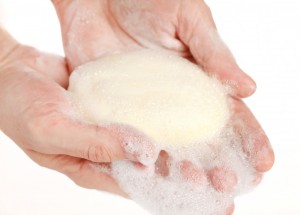-
Health & Wellness
Put Your Hands Together for National Hand-Washing Awareness Week
National Hand-Washing Awareness Week reminds us just how important hand-washing is for good health!
Towels vs. air dryers? Antibacterials vs. plain soap? Hand sanitizer vs. soap and water? Below are some answers to frequently asked hand-hygiene questions. (Thank you to Mayo Clinic Infection Prevention and Control for this great information.):
- Bacteria are more likely to spread from wet hands than dry, so drying is an important step in hand-washing. Studies suggest paper towels are more effective and reduce the contamination potential in restrooms compared to air dryers. Towels allow you to turn off the faucet and open the door without contaminating your hands. So, when given the option, use a towel over an air dryer.
- It is estimated that 1 in 6 Americans (roughly 48 million people) get sick from foodborne diseases each year. Norovirus causes the most illness each year and often is associated with poor hand hygiene. Food is easily contaminated by infected food handlers.
- There is no evidence that antibacterial soaps are more effective than plain soap for preventing infection under most circumstances in the home or public places. Therefore, plain soap is usually recommended in public, non-health-care settings. Note: There may be specific areas at Mayo Clinic that use antibacterial soap (e.g., surgical areas and operating rooms).
- Although hand sanitizer is the preferred method of hand hygiene in the health care setting (this is due to its accessibility), soap and water are required before eating, after using the restroom, and when hands are visibly soiled.
For more information about the importance of hand-washing, watch this CDC video, Put Your Hands Together.
Also, see this video from our Mayo Clinic News Network colleagues, Are you washing your hands long enough to kill germs?
Related Articles

Gastroenterology







